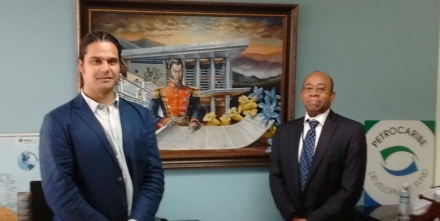Latin American governments and the politics of oil takes PhD researcher to South America and the Caribbean

Research fieldwork took PhD candidate Carlos Eduardo Morreo to South America and the Caribbean to investigate how the politics of oil and Latin American left-wing governments mix.
“When we hear people talk about oil and politics, we curiously tend to erase politics and simply hear ‘oil prices’”, says Carlos. “Oil, its politics and political economy are usually discussed in narrow terms. For some reason many academics believe that the discussion can be boiled down to ‘oil in developing nations is more or less bad for democracy’ or ‘state-ownership of oil is more or less bad for a country’s economy’”, argues Carlos.
Carlos Eduardo Morreo, a PhD candidate from the School of Politics and International Relations is putting forward an alternative reading of the relation between the political and oil. His research takes into account contemporary social theory that seeks to overcome the nature/society dichotomy and research approaches that emphasise the constructed nature of economic knowledges.
“I’m looking at two oil programs put forward by leftist governments in South America, Ecuador’s ecologically oriented Yasuni-ITT Initiative and Venezuela’s Caribbean focused Petrocaribe Energy Cooperation Program. My research here at SPIR is about trying to understand how the governing of oil, in particular places and at particular times, makes oil a political substance, and how the societies or ‘social assemblages’ in which this oil circulates are also remade though this political oil. Thus, detailed case study research becomes very important”.
A highlight of Carlos’ research so far has been travelling overseas for fieldwork in Ecuador, Venezuela and Jamaica. This experience brought home the complexity of oil’s governance –-policies, production and circulation-- and the ways in which these oil programs shape these societies.
“I had been reading for many months about the Ecuadorean initiative in the Amazon, which attempted to leave oil in the ground, and thus challenged the usual oil politics narratives. I had also been looking into the Venezuelan program in the Caribbean with its unique barter-like arrangements for some time. But it wasn’t really until I got to Quito and later in Kingston, and was able to speak to many of the key actors involved in the two cases, that I was able to pick up on the greater complexity that my reading, thinking and analysis had been hinting at. The existing literature simply hadn’t thought to ask the questions I was now asking of my research!”
Meeting key actors not only served to inform and sharpen Carlos’ research aims, but also expanded his academic and research network in the region.
“In total I spent about three months in Caracas, Quito and Kingston. And most of my days were spent chasing up interviews, rewriting my interview questions, talking informally to people and, of course, interviewing people about the projects. I was able to talk to top government officials, diplomats, mid-level bureaucrats, social movement activists, and everyday people.
Their insights into the Amazonian oil program and Venezuela’s Caribbean effort were often informed by all manner of concerns that I simply could not have grasped and seen without ‘being there’. I was also struck by how generous some people could be with their time, sharing their views and describing how things work or don’t work”.
While overseas Carlos also discussed aspects of his research at two large interdisciplinary conferences held by the Facultad Latinoamericana de Ciencias Sociales (FLACSO) in Quito and the Society for the Social Studies of Science (4S) in Denver, Colorado. The fieldwork and conference presentations were made possible by a SPIR 2015 Grant in addition to RSSS PhD fieldwork funding.
After completing his Bachelor of Arts (Honours) at the University of Melbourne, Carlos taught and worked for a couple of years in Australia and Venezuela, deciding that a PhD in the social sciences, around postcolonial themes in international relations and political economy would be a challenging way in which to pursue his research interests.
“The ANU and Canberra are good places to work, there are many academics and bright postgraduates who are equally interested in politics, social theory and interdisciplinary approaches. Though it might take some time to gather these people around you! ‘Postcolonialism’ is one of those key words to bring different approaches together”.
Interested in Latin American Studies or postcolonial and interdisciplinary approaches to politics. Sign up to ANCLAS and the ANU Postcolonial Scholars’ Network.








